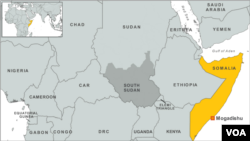Renowned Somali author and poet Mohamed Ibrahim Warsame, better known by his pen name Hadraawi, died Thursday in the Somaliland capital, Hargeisa, according to family members. He was 79.
Widely regarded as the greatest living Somali poet, and called “the Shakespeare of Somalia,” Warsame had battled illness for years that left him hospitalized.
Somali President Hassan Sheikh Mohamud expressed the country’s sorrow.
“We have lost an icon in Somali [literature]," Mohamud said. "A man whom we will remember for his role in peace-building and conflict resolution, building the mindset of many Somalis through his wisdom and poems for the betterment and the unity of Somalis. I console to all Somali people and his family for his departure."
Somaliland President Muse Bihi Abdi also lamented the loss of a colossal figure in Somali arts and letters.
“It is a painful moment for us and for all Somali-speaking communities in the region, a day we lost a great man,” Abdi said. "We will organize his national level funeral and events for his legacy and history."
Hirsi Dhuh Mohamed, head of the Somali Music Composers Council, said Warsame had been Somalia’s greatest living poet.
“He was the ever-living Somali poet whose poetry addressed themes of love, kindness, national solidarity and uncompromising directness,” said Mohamed.
Mohamed Aden Dacar, a Somali artist and poet who worked with Warsame, called him "one of the remaining pillars of Somali arts and culture."
"In their declaratory rhythms as well as their content, his poems often echoed as the pioneer of Somali people in the direction of peace and reconciliation,” Dacar said.
Born in 1943 in Somalia’s Togdheer region, Hadraawi, which means “master or father of speech,” was a household name.
According to “Hal Ka Haleel,” a compendium of his legacy and work, Hadraawi wrote the lyrics to more than 200 epic poems and the lyrics to more than 70 songs.
His early work and the songs were typically broadcast throughout the Horn region.
“Hooyoy La’aanta,” (“The Mother”), was one of his all-time favorite melodies.
The poet also played a role in the fight against dictatorship in the 1970s, criticizing late Somali President Mohamed Siad Barre's government for its oppression of the masses.
Imprisoned for five years for his efforts to create a democratic society free of state control, he later fled to neighboring Djibouti where he continued his political criticism by writing poems that were memorized and recited by Somalis.
After Siad Barre’s downfall in 1991, Hadraawi, who had no personal political ambitions, began efforts to restore peace in Somalia.
In the second half of 2003, he traveled the length of Somalia preaching peace and nonviolence, and promoting understanding and reconciliation among all ethnicities and diasporas.
Throughout his long "peace caravans," he was welcomed as a beacon of hope and a desperately needed spiritual leader who could fill the nation's leadership vacuum.
This story originated in VOA's Somali Service.




